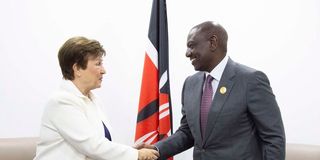We need to free ourselves from foreign aid yoke?

President William Ruto during a meeting with the International Monetary Fund Managing Director Kristalina Georgieva in Sharma El-Sheikh, Egypt.
There once was a man who walked on water. He had the courage to do something so incredible that, centuries later, we all know about it.
The essential component of this historic event is that there must be great courage over fear. At this point in time, Kenya and the great continent of Africa must ask themselves: Shall we stay in the proverbial boat of constantly needing help for basic needs because it’s safe and familiar, yet intolerable, or should we step out into the unknown?
Kenyans and Africans at large are quite ready to stop receiving help at every turn. Different heads of state have openly attested to this fact. We have so much to offer the world, but our innovation, passion and work ethic keep being overshadowed by unrest in certain parts of the country or by food security challenges.
Kenya has a government that is able to scale this nation higher should we choose the narrow path, the road less travelled, the isolated route.
We should focus on improving the lives of our people and developing our businesses and infrastructure without compromising our authority. Chapter 6 of our Constitution tasks our leaders to bring honour to the nation. Africa is a proud continent, and we are adorned with minerals and a rich cultural heritage to show for it.
That said, aside from natural disasters, whose effects should be remedied by the Disaster Management Fund, and drought, has the National Drought Emergency Fund, which is the centralised platform where Kenyans can support Kenyan projects, both locally and in the diaspora.
Belief systems
I understand that the new government inherited a financial mess, but what are the passion projects that the government has determined should be hands off to foreign donors? The ones we must do for ourselves for the sake of preserving our dignity and the integrity of our culture and belief systems? Some donor-funded projects have begun to seep into the county level, but what are the exit clauses? Has this been regularised by policy?
How much help could a country possibly need before its people become spectators of their own development agenda? History teaches us that some among us have an insatiable appetite for dominance.
We must say no to foreign aid. Can we create a permanent fund where Kenyans and fellow Africans can continually donate in cash and kind to areas of need and development?
Can we create an avenue for us to help our fellow Kenyans that is not exchequer-dependent? The diaspora community would be willing to support their childhood schools, universities, clinics and marginalised communities if there is structure. Can we digitise and regulate such an online platform with special attention to the role of the Auditor-General for transparency?
Can we create tax incentives and exemptions for African-owned producers who support these efforts? We hold the solutions to our challenges. Thomas Sankara’s words remain true, “We must learn to live the African way, it is the only way to live in freedom and with dignity.”
Ms Njirwa is an Advocate of the High Court. @PatriciaNjirwa





